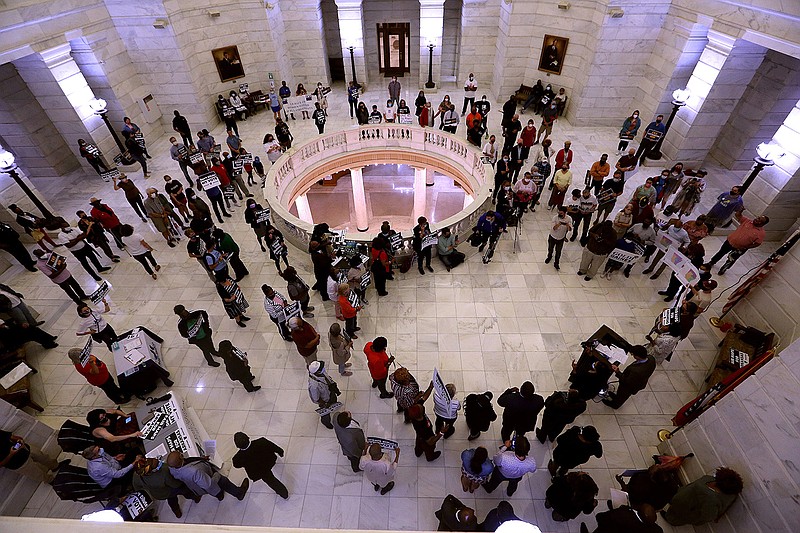Cheers and chants rang out from the state Capitol rotunda Thursday as voting-rights advocates gathered to speak out against Arkansas' recently enacted congressional redistricting plan.
More than 100 people, including leaders of the Arkansas Legislative Black Caucus and the state Democratic Party who called the map that the Legislature passed last week blatant racial gerrymandering, attended and applauded the speakers.
Act 1114 and Act 1116 redraw the state's congressional districts in accordance with U.S. census data, which lawmakers are obligated to do every 10 years. The plan splits the state's most populous county between three congressional districts, shifting 21,000 Black residents of Pulaski County out of the 2nd Congressional District and into the 1st and 4th districts.
Gov. Asa Hutchinson announced Wednesday that he would let the bills become law without his signature.
The lines separate majority-minority areas of the county, as well as the cities of Little Rock and North Little Rock, from the bulk of Central Arkansas, a move that speakers at the rally argued is designed to dilute the voting power of Black and brown Arkansans.
"Who is just as upset about these unfair maps like me?" Debrah Mitchell, president of the Arkansas Democratic Black Caucus, asked the crowd.
Democratic Party of Arkansas Chairman Grant Tennille said he saw people at the rally who have been "fighting this fight since 1965 and before."
"This is an injustice, and it's nothing new," he said.
Sen. Linda Chesterfield, D-Little Rock, said the current time reminded her of the 1960s, when "we had to fight like h* * * to get what we needed."
"We've got to fight like h* * * now," she said.
Multiple speakers noted that Arkansas is the only Southern state to have never elected a Black member of Congress, and that the new map would ensure that would not happen.
"It is not by accident that it has not happened in Arkansas, it's by design," Phillips County attorney James Valley said.
Proponents of the bills said they were not gerrymandering and did not take race into account when drawing the lines, touting the map as one that brings the four districts as close to equal in population as possible.
Some lawmakers said Pulaski County was a natural place to draw the lines because of its population and location, but those who objected to the bills said it was unnecessary to divide any county in order to draw a good map.
Opponents of the redistricting plan have promised that there would be litigation.
"This fight's not over. We're going to court. We're going to fight, and we're going to scream until they make it right," Tennille said.
Tennille said in an interview afterward that there will likely be multiple groups involved in a lawsuit and the party will play a role, but the details and time frame were still being worked out. Since the redistricting laws did not pass with an emergency clause, they go into effect 90 days after the end of the legislative session.
Another course of action to prevent the redistricting plan from being implemented is a constitutional veto referendum. If 54,000 signatures are gathered within 90 days of the session's adjournment, the measure can be put on the November 2022 ballot for voters to decide.
Kwami Abdul-Bey, founder of Arkansans for a Unified Natural State, said he believed the group can get the signatures necessary for that effort in two to three weeks.
"There is no civil-rights army that is parachuting into Little Rock to help us out with this," Abdul-Bey said. "No one's going to save us. We have to save ourselves."
Hutchinson, a Republican, said he did not veto the redistricting bills because he was deferring to the General Assembly's prerogative, as the U.S. Constitution grants redistricting authority to state legislatures, but that he was concerned about the map's impact on minority populations.
The state Senate Republican caucus responded to Hutchinson's comments and the state Democratic Party's criticism of the map in a statement Thursday, rejecting "any notion that the congressional map passed by the legislature is out of line with Supreme Court precedent.
"If Governor Hutchinson had sincere concerns, he could have raised them at any point during the process. This map is lawful and the courts will uphold it," the statement on behalf of the chamber's 27 GOP members reads.
The caucus noted that this year marks the first time Republicans have drawn the congressional map since the Reconstruction era.
"For 140 years, Democrats have been in complete control of the redistricting process. During that time they have continued to gerrymander maps and split multiple counties in an attempt to secure political power. Now they choose to cry foul over a map that splits fewer counties than the maps they have drawn," the statement said.
The current maps, which were drawn in 2011, split five counties between congressional districts. The new map splits two, with the other being Sebastian County.
The Republicans don't depend on a redistricting process to win elections, "unlike the Democrats," they said.
"We will continue to earn the trust and confidence of Arkansans by ensuring that our platform reflects their beliefs and values. That is why Republicans have continually won in districts drawn by Democrats," the caucus said.


